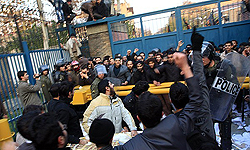Western Envoys’ Return to Tehran Shows Failure of Enemies’ Plots against Iranian Elections

The return of the European states’ ambassadors to Tehran indicates the failure of the plots hatched by enemies against the March 2 parliamentary elections in Iran, Iranian university students said in a statement released on Monday.
Some European capitals recalled their ambassadors from Tehran after an hour-long demonstration inside the British embassy in Tehran in November by thousands of angry university students who were furious at London’s hostile policies against Iran. The envoys have returned to Iran in recent days and after Iranians staged a high turnout in the Friday parliamentary elections in the country.
“We know very well that you had pinned hope on a low public turnout in the parliamentary elections and your hopes, which were based on the wrong analyses dictated by the British, were dashed once again,” said the statement of the Iranian students.
“And you admitted to your mistake by your return,” it added, addressing the few European states who had recalled and returned their ambassadors to Tehran.
The statement referred to the Iranian people’s high turnout in the parliamentary elections on March 2, and said that the massive participation of the nation in the elections was like a slap across the face of the European and American politicians.
The Iranian students November protests at the British mission came after the Iranian legislators in an open session of the parliament in November approved the bill of a law on downgrading relations with Britain. After the parliament approval, Iran expelled the British ambassador from Tehran.
The parliament approval came a week after the US and Britain targeted Iranian financial sectors with new punitive measures, including sanctions on Iran’s Central Bank and petrochemical industry.
The sanction against CBI and Iran’s petrochemical industry was adopted in a unilateral move by the US, Canada and Britain outside the UN Security Council as other council members, specially Russia and China, had earlier warned against any fresh punitive measure, including sanctions, against Iran.
The British government has also embarked on delisting the anti-Iran terrorist Mojahedin-e Khalq Organization (MKO) from its list of terrorist groups.
The Iranian lawmakers initially started drafting a bill to downgrade ties with London after Britain’s direct involvement in stirring post-election unrests in Iran in 2009, but they intensified and accelerated the move after former British Envoy to Tehran Simon Gass criticized the human rights situation in Iran.
“Today, International Human Rights Day is highlighting the cases of those people around the world who stand up for the rights of others – the lawyers, journalists and NGO workers who place themselves at risk to defend their countrymen,” Gass said in a memo published by the British Embassy in Tehran on December 9, 2010.
“Nowhere are they under greater threat than in Iran. Since last year human rights defenders have been harassed and imprisoned,” Gass added.
Following Britain’s support for a group of wild demonstrators who disrespected Islamic sanctities and damaged private and public amenities and properties in Tehran on December 27, 2009, members of the parliament’s National Security and Foreign Policy Commission drafted bill of a law requiring the country’s Foreign Ministry to cut relations with Britain completely.
The British government’s blatant stance and repeated remarks in support of the last year unrests inside Iran and London’s espionage operations and financial and media support for the opposition groups are among the reasons mentioned in the bill for cutting ties with Britain.
Iran has repeatedly accused the West of stoking post-election unrests, singling out Britain and the US for meddling. Tehran expelled two British diplomats and arrested a number of local staffs of the British embassy in Tehran after documents and evidence substantiated London’s interfering role in stirring post-election riots in Iran.







